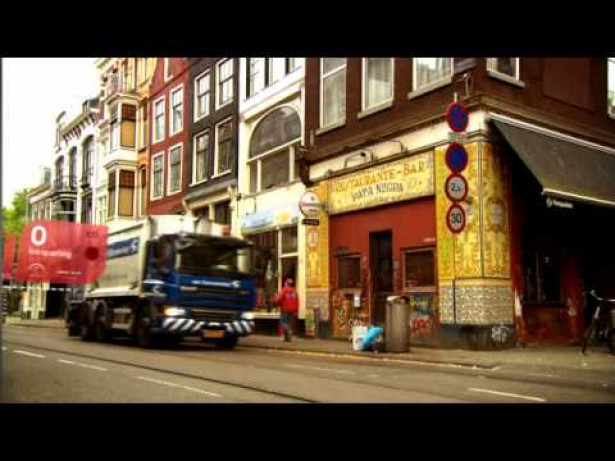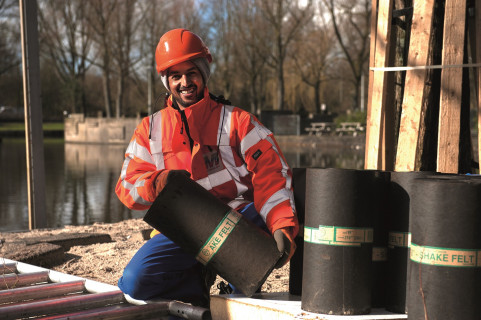A conclusive approach for every status holder that enters the Amsterdam Approach to Asylum Status Holders.


A conclusive approach for every status holder that enters the Amsterdam Approach to Asylum Status Holders.

Asylum status holders are refugees who have been granted asylum status. The City of Amsterdam aims to provide these asylum status holders with a place in the city as soon as possible. We are doing this by helping to fast-track them towards work, education or setting up a business. If this is not (yet) possible, then we help them first towards care providers or participation in society. To this end we have developed a new approach.
In The Netherlands, everyone that receives social benefits under the Law on Participation is required to take part in activities aimed at (re-)entering the labour
market in order to be self-sufficient. All asylum status holders receive benefits under this law when they first obtain their status. The emphasis is on providing support for quickly
getting clients a job or an education, together with citizenship education. We aim to get this process underway while asylum status holders are still living in the asylum seekers’ centre in Amsterdam. Customized support is the key factor here. The city authorities apply an intensive, personal, sustainable and integrated approach for these new Amsterdam citizens. The approach comprises support for, among other things:
• work
• education
• entrepreneurship
• participation
• citizenship education
• language skills
To this end the City of Amsterdam deploys casemanagers from the Entry Team (Team Entree),the Activation Team (Team Activering) or the Young
People’s Support Points (Jongerenpunten), in each case assisted by job hunters. These are specially trained to support and guide asylum status holders.
The project is initiate by alderman Arjan Vliegenthart (Work), Kajsa Ollongren (Economy) and Simone Kukenheim (Integration) from the city of Amsterdam.
As municipality we collaborate with many organizations to realize the approach, including:
• the Central Agency for the Reception of Asylum Seekers (COA)
• Ministry of Social Affairs and Employment
• the Municipal Health Service (GGD)
• the Dutch Council for Refugees
• housing corporations
• social work organizations
• employers
• private initiatives
We involve employers in various ways. To give one example, we have drawn up the ‘Amsterdam works for everyone’ covenant. Employers here undertake to offer job vacancies or internships that are tailored to asylum status holders. We have also made agreements with the providers of citizenship education courses, regarding issues such as a good flow of information between the casemanager and the course teacher.
Ambition for 2017 is:
A conclusive approach for every status holder that enters the Amsterdam Approach to Asylum Status Holders. This means:
• every status holder will be counseled by a dedicated casemanager;
• with every status holder we make a action plan and make use to the available new instruments and from the subsidised initiatives. In this action plan short and long term goals will be taken.;
• based on a assessment (or intake) and the arranged action plan every status holder will be counseled to work, entrepreneurship, education or when this is not (yet) possible we help them first toward care providers or participation in society.
• every status holder pursue a customized language and orientation program .
• the program provides support for the status holder for a maximum of three years, because the period of civic integration. The ambition is that 50% of the status holders after three years no longer depents on social benefits.
The targets for 2017 are:
• Support of 1.200 status holders. The ambition from the City of Amsterdam in 2017 is housing of 1.600 status holders. About 75% of the new status holders will be part of The Amsterdam Approach to Asylum status Holders (except for children under 18 years old);
• Implementation of 1.200 assessments (assessment tracks);
• Implementation of 600 intensive language courses (language boost);
• Custumized language and orientation program for every status holder.
Success factors
• Dual approach to support and guidance towards work or education, together with
citizenship education.
• The approach begins in the asylum seekers’ centre, enabling asylum status holders to put their waiting period to good use.
• Time for a focused, specific, customized approach to each asylum status holder,
with the talents of the asylum status holder serving as our starting point.
• The casemanagers have specific knowledge about the asylum status holders, speak
different languages and have diverse cultural and working backgrounds.
• A regular casemanager provides support for around fifty people.
• Special training courses focus on dealing with this specific group.
• Various specialists are combined within one team: casemanagers, job hunters, coaches and income counsellors.
• The counsellors of the Dutch Council for Refugees are present at the locations where
the casemanagers work, thus enabling quick consultation and coordination.
• Focused use of instruments relating to work and language.
• Special instruments also available, such as:
Get notified about new updates, opportunities or events that match your interests.

In 1901, sixteen dairy farmers in the vicinity of Amsterdam, decided to establish the "Ilpenstein" cheese factory. My grandfather, Piet Nieuweboer, was one of the directors of the cooperative. The reason for collaboration within the cooperative? Cheesemaking traditionally takes place at the farm itself. The cheese factory made it possible to use innovative cheesemaking techniques. Even more important was the collaboration to improve the distribution and marketing of the cheese towards customers.
With the course "Biologisch Tuinieren in de Stad", we have trained almost two hundred new urban farmers in the city of Arnhem. Organic urban farmers with a food garden of half a square meter till half a hectare. It is a dream that these organic urban farmers, and others, will eventually find and learn from each other. Our initiative is the establishment and growth of the "Biologische Stadsboeren Coöperatie Arnhem Groen". An organic urban farmers' cooperative focused on economic collaboration in a green Arnhem.

Kun je nog weten wat betrouwbaar is in tijden van generatieve AI en deepfakes?
Deze Nederlandstalige lezing is bedoeld voor iedereen die meer wil weten over de risico’s van deepfakes (denk aan stemklonen, plaatjes en chatgpt).
Wat is de globale werking, waar kom je het tegen, wanneer moet je extra voorzichtig zijn en wat kun je doen om jezelf te beschermen en manipulaties te doorzien.

Join us for the workshop: Civic Sousveillance & Democratic Oversight of Sensor Technology.
In this interactive workshop, we explore democratic oversight of camera detection and other urban sensors: from citizen initiatives such as the On Camera pocket guide and smart city camera-spotting tours to current policies on data collection in public space.
With contributions by Tom van Arman & Mike de Kreek from the Human Values for Smarter Cities research project, Inge Janse & Arthur De Jaeger from Centre for BOLD Cities, and council member Elisabeth IJmker from GroenLinks-PvdA. Next to talks we will also go outside for a joint camera-spotting tour around Arcam.
Date: Thursday, January 29, 2026
Time: 4:00 p.m. – 6:00 p.m.
Location: Arcam
Address: Prins Hendrikkade 600
Language: Dutch
Registration: free, but mandatory via the registration form which is here
More info on the Human Values for Smarter Cities research project is here

